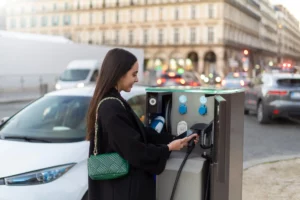
Home / EV Charging News / Converting Electric Vehicles: The Process of converting conventional gasoline vehicles to electric vehicles, including the benefits, challenges, and available conversion options
Electric vehicles (EVs) have gained significant popularity in recent years due to their environmental benefits and potential cost savings. While many consumers are opting to purchase new electric vehicles, there is also the option to convert existing conventional gasoline vehicles into electric ones. This article explores the process of converting gasoline vehicles to electric vehicles, including the benefits, challenges, and available conversion options.
Converting a conventional gasoline vehicle to an electric vehicle involves replacing the internal combustion engine and fuel system with an electric motor and battery pack. This process allows the vehicle to run solely on electricity, eliminating the need for gasoline consumption and reducing carbon emissions.
The cost of converting a gasoline vehicle to electric varies depending on factors such as the vehicle’s make and model, desired range, performance upgrades, and the conversion method chosen. On average, conversion costs can range from several thousand to tens of thousands of dollars.
Converting a vehicle to electric requires adherence to safety regulations and electrical codes. It is crucial to consult local authorities, professional conversion shops, and electricians to ensure compliance with safety standards.
Converted electric vehicles require regular maintenance, including battery pack inspections, motor and controller diagnostics, and software updates. It is recommended to follow the manufacturer’s guidelines or consult conversion experts for proper maintenance procedures.
Converting gasoline vehicles to electric contributes to reducing greenhouse gas emissions and air pollution. By repurposing existing vehicles, the environmental impact of manufacturing new vehicles is minimized.
Converting conventional gasoline vehicles to electric offers several benefits, including environmental sustainability, cost savings, and improved performance. While the conversion process requires technical expertise and faces challenges such as limited availability of conversion kits, the increasing popularity of electric vehicles is driving advancements in this field. As the market expands, more options and resources for vehicle conversions are becoming available, making it an exciting prospect for individuals looking to make their transportation more sustainable.
